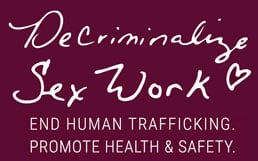August 25, 2022
DSW’s Melissa Broudo is featured in Morning Brew’s Sidekick.
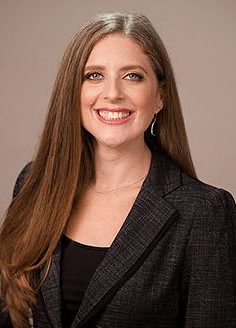
DSW’s Melissa Broudo is featured in Morning Brew’s Sidekick.

It was a busy and productive summer for DSW staff as they traveled to multiple influential conferences to discuss the critical need to decriminalize consensual adult sex work. Staff had the opportunity to participate in panel discussions, to present their work, and to engage with legislators and academics among others.
Staff Attorney Becca Cleary and Communications Director Ariela Moscowitz traveled to Denver, CO, for the Annual Legislative Summit of the National Conference of State Legislatures. They met with numerous legislators from around the country to discuss decriminalization and incremental measures states can take to improve the health and safety of sex workers and the community and to combat trafficking. These incremental measures include immunity laws that would allow individuals to seek medical attention and report crimes without fear of their own arrest and study commissions focused on evaluating prostitution laws, addressing trafficking concerns, and identifying better ways to create support systems for both sex workers and trafficked people.
Legal Director Melissa Broudo, Research and Project Manager J. Leigh Oshiro-Brantly, and Cleary took part in the Woodhull Freedom Foundation’s Sexual Freedom Summit. Broudo moderated “Lawyering for Sex Workers,” which focused on the legal issues surrounding sex work, human trafficking, sexual freedom, and human rights. She also joined Oshiro-Brantly to present “The Role of Inclusive Sexual Education in Promoting Human Rights and Trafficking Prevention.” DSW volunteer attorney Allison Kolins moderated while Broudo and Oshiro-Brantly discussed the findings of their paper published in the 2021 edition of the Charleston Law Review. The paper examined sex negativity and gendered, homophobic, and transphobic ideas, particularly in the context of school and community based learning, as contributing factors to exploitation risk on a continuum of sexual abuse, including trafficking, throughout an individual’s life course. Cleary shared her presentation, “Strategies to Advance the Human Rights of Sex Workers,” which focused on much-needed policy reforms.
Crystal DeBoise, director of strategic partnerships, Political Director Rob Kampia, and Oshiro-Brantly attended the Global Meeting of the Law and Society Association in Lisbon, Portugal. This year’s theme “Rage, Reckoning, and Remedy” highlighted issues of race and colonialism and the extent to which historical legacies impact current realities. Oshiro-Brantly presented their paper, “Continuum of Exploitation: The Role of Inclusive Sexual Health Education in Preventing Human Trafficking of Minors” as part of the “Vulnerable Gender: Protection Against Legal Inequality, Social Exclusion, and Sexual Exploitation” track. DeBoise presented on decriminizalizing sex work with a panel of international experts.
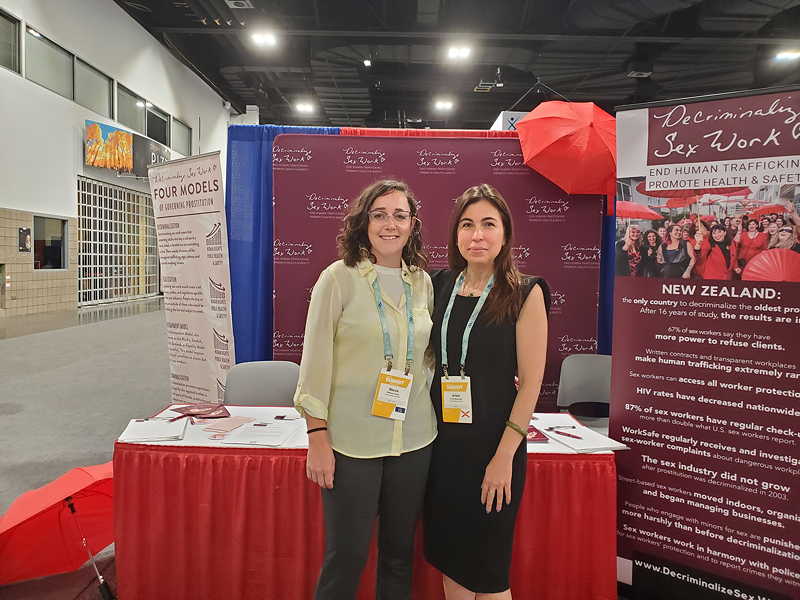
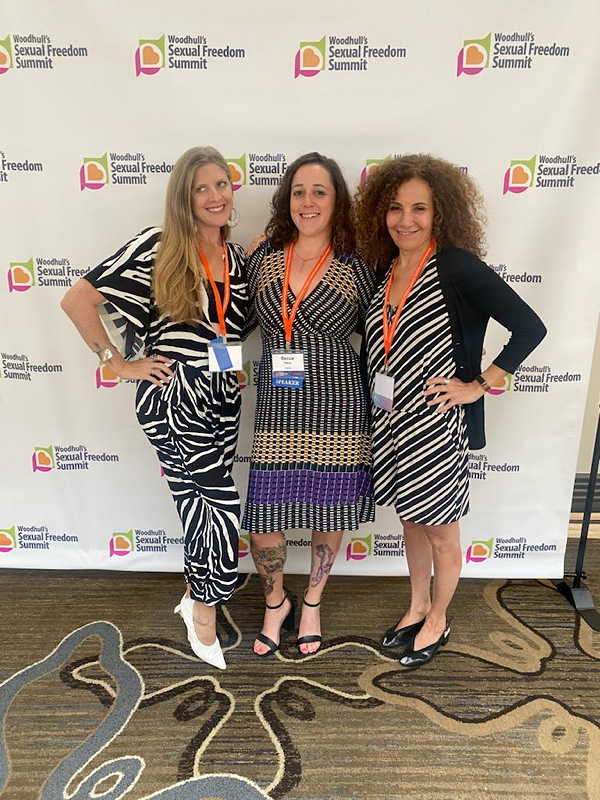
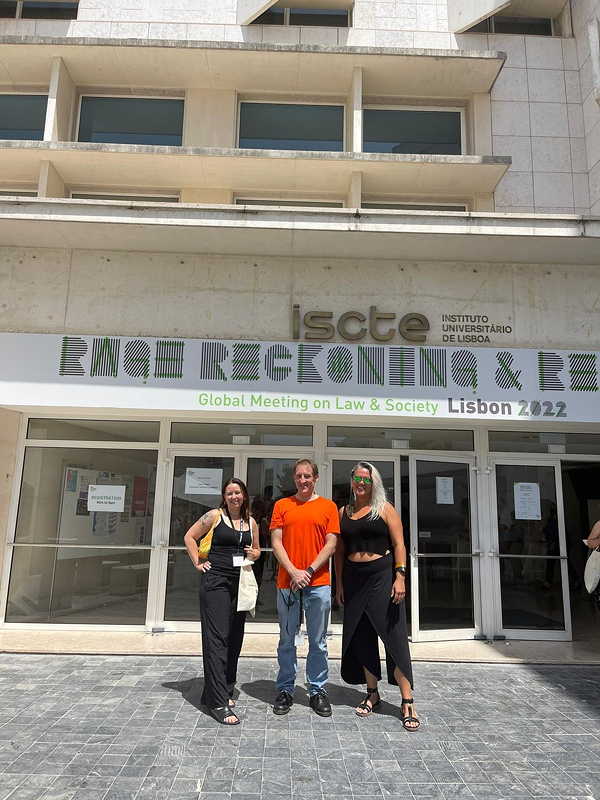


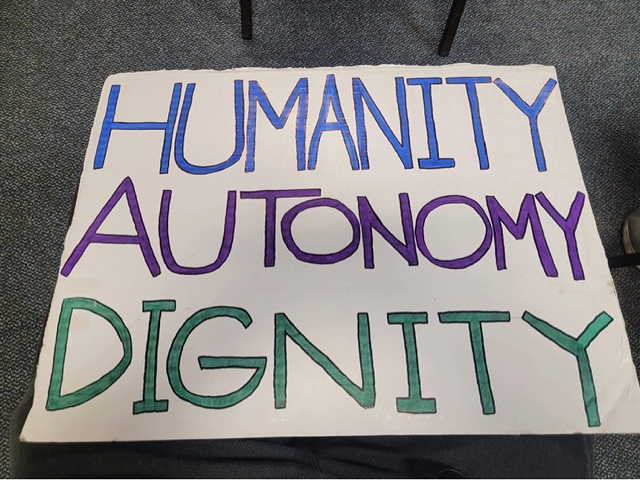


DSW Research and Project Manager J. Leigh Oshiro-Brantly presented on the intersection of LGBTQIA individuals and sex workers’ rights at the June 13 meeting of a legislative study commission in Rhode Island. Oshiro-Brantly co-presented with Henri June Bynx, who is also a sex worker and activist.
Their presentation highlighted the parallels in the criminalization and stigmatization of sex work, gender identity, and sexual orientation. It delved into the inextricable links between the deleterious effects of marginalization both for sex workers and LGBTQIA individuals and their converging fights for equal freedoms and treatment under law. Oshiro-Brantly and Bynx grounded their presentation in data from Rhode Island and beyond demonstrating that LGBTQIA individuals and particularly those who engage in sex work are disproportionately targeted by the criminal justice sytem. They face harassment, profiling, and discrimination — and, once saddled with a criminal record because of this, they face extraordinary barriers to housing, employment, and other critical resources necessary to sustain life.
Their presentation concluded with the below recommendations for Rhode Island, though these recommendations are widely applicable to all states and municipalities:
1. Pass a law that grants immunity from prosecution to people engaged in commercial sexual activity if they report to law enforcement that they are victims of or witnesses to a crime. (Read more about Immunity/Good Samaritan laws as they relate to sex work here.)
2. Fully decriminalize consensual adult sex work.
3. Repeal “Loitering for Prostitution” and “Loitering for Indecent Purposes” which have become known as “Walking While Trans Bans” as law enforcement uses these statutes to profile, harass, and arrest transgender women.
4. Repeal Section a. In the Human Immunodeficiency Virus (HIV) Law (§ 11-34.1-12), which stipulates that: (a) Any person convicted of a violation of any provisions of chapter 34 shall be required to be tested for Human Immunodeficiency Virus (HIV). No consent for the testing shall be required.
5. Pass House Bill 5464 — patients will not be denied appropriate healthcare on the basis of their sex work history.
6. Pass Senate Bill 249/ House Bill 6049 — which would create a new criminal offense of “custodial sexual assault,” which occurs when a peace officer perpetrates a sexual assault while a victim is in their custody.
The RI study commission was formed last year following the unanimous passage of House Resolution 5250, which proposed a special legislative commission to study ensuring racial equity and optimizing health and safety laws affecting marginalized individuals. The bill, as passed, delineated who should sit on the commission, which includes 13 members, including individuals with lived experience. Other members of the commission include two legislators, a member of COYOTE RI, a representative from Amnesty International, two representatives of organizations serving populations disproportionately impacted by the criminalization of commercial sex, the director of the Rhode Island Department of Health, an attorney from the Rhode Island Public Defender’s Office, the Rhode Island attorney general, or designee, a representative from the Brown University Center for the Study of Slavery and Justice, and the president of the Rhode Island Police Chief’s Association, or their designee.
DSW advocates for the creation of study commissions focused on evaluating prostitution laws, addressing trafficking concerns, and identifying better ways to create support systems for both sex workers and trafficked people. A study commission should examine and provide recommendations on the health and safety impacts of revising laws related to commercial sexual activity; identify the methods of human trafficking and exploitation to develop strategies to reduce these activities; and ensure accountability in the treatment of marginalized and targeted communities by police. Prostitution laws are often applied in a way that creates an environment in which exploitation thrives. Those laws often disproportionately harm already marginalized communities. They also fail to meaningfully address the issue of human trafficking. There is a need to comprehensively research and then reform legal and support systems around sex work and trafficking in order to keep people safe and ensure access to resources.
Read our fact sheet on study commissions to review existing laws and address trafficking and exploitation here.
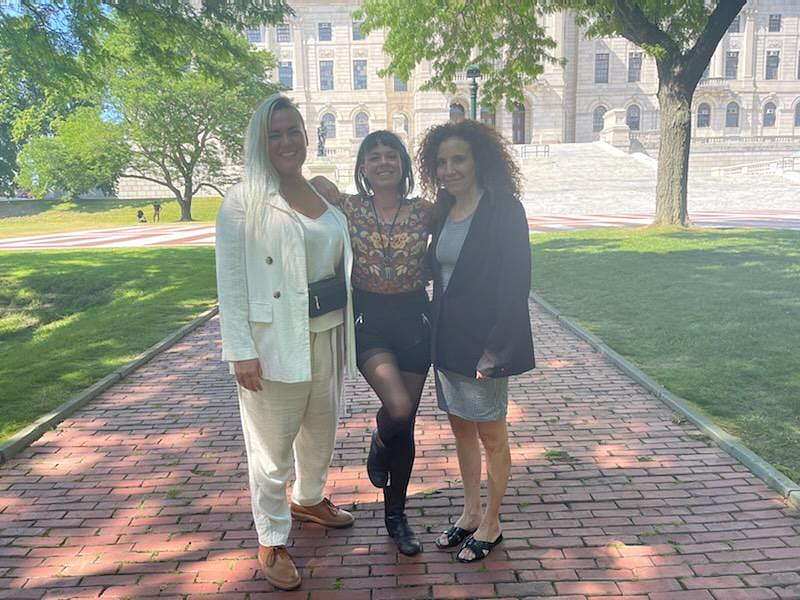




Throughout the month of May, DSW staff participated in a number of panels and discussions highlighting the harms of criminalization, pending legislation on sex work, and reminding sex workers of their rights!
DSW Legal Director Melissa Broudo joined the New York County Lawyers Association for their May 2 webinar, “Pending Legislation on Sex Work Decriminalization.”
The New York County Lawyers Association provided this description of the program: The criminal justice system’s approach to sex work has changed in recent years as some area district attorneys’ offices have pledged to stop prosecuting some sex work related offenses, while some continue to prosecute those accused of patronizing and third parties.
Still, the continued criminalization of sex work disproportionately affects the LGBTQ community, communities of color and immigrant communities where, for many, sex work remains a means of survival in the face of economic insecurity.
Pending legislation in Albany (the “Stop the Violence in the Sex Trades Act” S3075/A849) aims to decriminalize sex work between consenting adults and allow workers a safe and secure environment, without the stigma and fear of judgment, arrest, and incarceration. Meanwhile, the “Sex Trade Survivors Justice and Equality Act” proposes asymmetrical criminalization [or client criminalization], eliminating penalties for some sex work related offenses, while levying fines against customers, roommates, drivers, and others. Both bills would continue to criminalize sex trafficking, exploitation, and coercion.
DSW was proud to sponsor and participate in Equality New York’s 2022 advocacy day. The day was filled with compelling and educational panels, discussions, and legislator meetings. DSW Research and Project Manager J. Leigh Oshiro-Brantly, volunteer attorney Alison Kolins and Legal Director Melissa Broudo traveled to Albany to take part in the event. Melissa Broudo moderated “The Criminalization of Sexuality: From Banned Books to Prison Walls,” during which panelists “explored the linkage from repressive/no sexual health education (banned books/banned teachings) to criminalization of people for gender expression and sexual acts (i.e. prostitution). The continuum of stigmatization and marginalization across these divergent — but connected — issues is central to understanding the continued backlash queer and trans folks receive when there are cultural and legal shifts. Silencing, shaming, stigmatizing, and ultimately criminalizing people for who they are or what they do with their bodies is a continuum that must be examined and fought.”
J. Leigh Oshiro-Brantly hosted the 2022 Transgender, Gender Non-Conforming, Non-Binary, and Intersex (TGNCNBI) Advocacy Day, spearheaded by New York Transgender Advocacy Group and the New York State Gender Diversity Coalition. The full day of programming included “Sex Work Issues and Legislation,” during which DSW Staff Attorney Rebecca Cleary and Ceyenne Doroshow discussed the fight to decriminalize sex work and lift up sex workers, the 2021 repeal of the “Walking While Trans Ban,” the pending immunity bill, and Supreme Court Justice Alito’s leaked draft opinion on abortion rights and its connection to sex work.
Melissa Broudo and J. Leigh Oshiro-Brantly traveled to DomCon in Los Angeles where they shared information about the critical need to decriminalize consensual adult sex work throughout the conference and also presented “Sex Work, Fetish Work, and the Law.” Their presentation explained the different legal and regulatory bodies that affect people involved in all forms of sex work, including fetish work — even in ways that one may not expect. They also discussed how to navigate legal digital spaces post-SESTA/FOSTA.


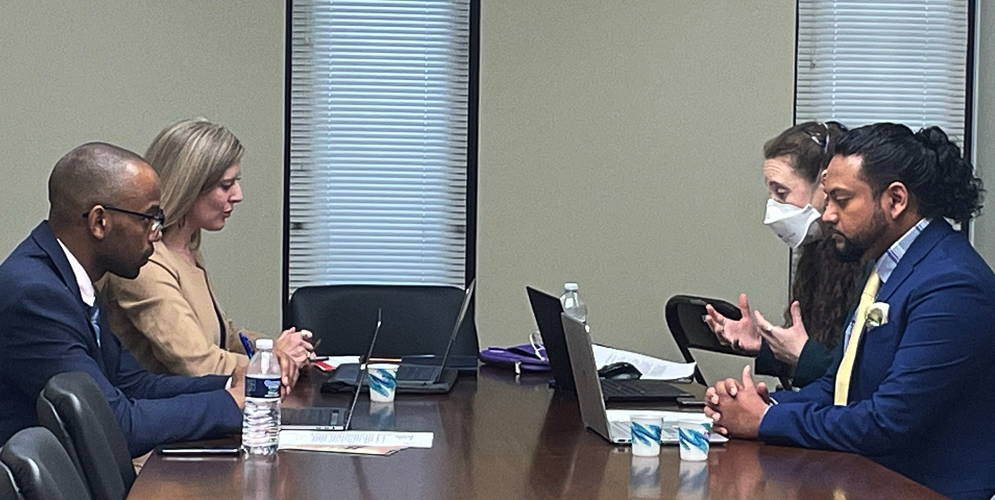

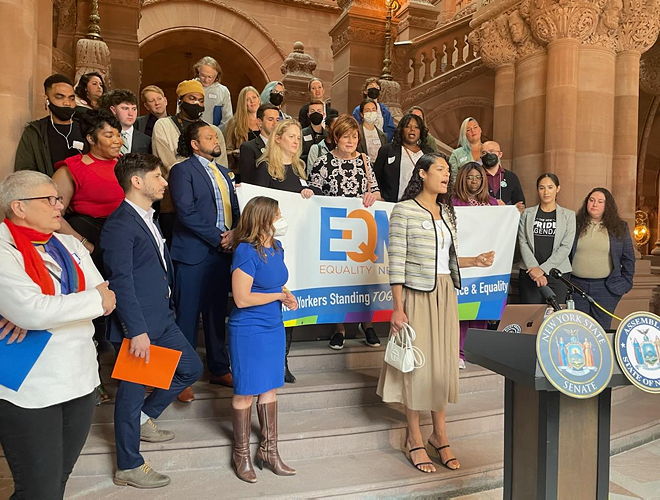

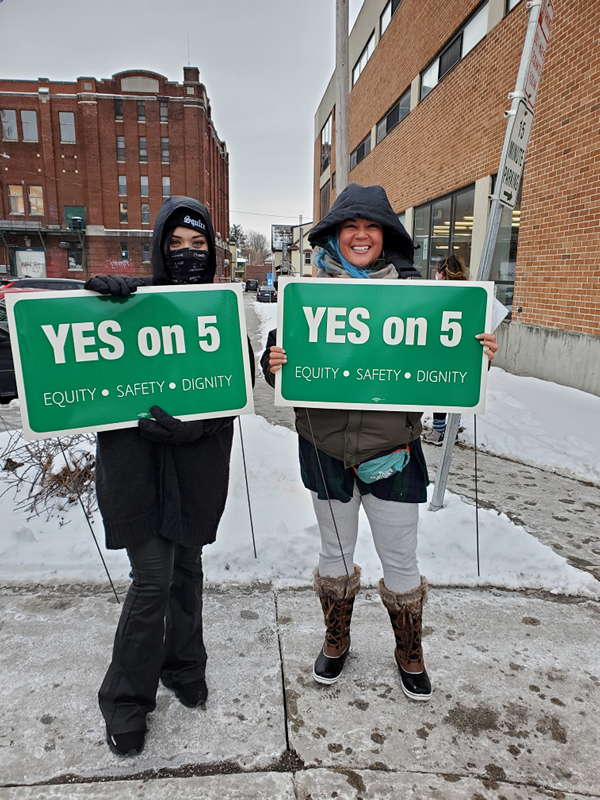

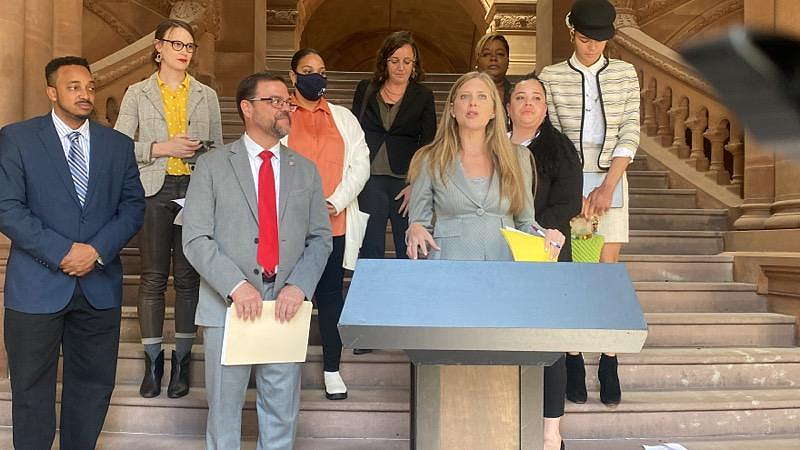

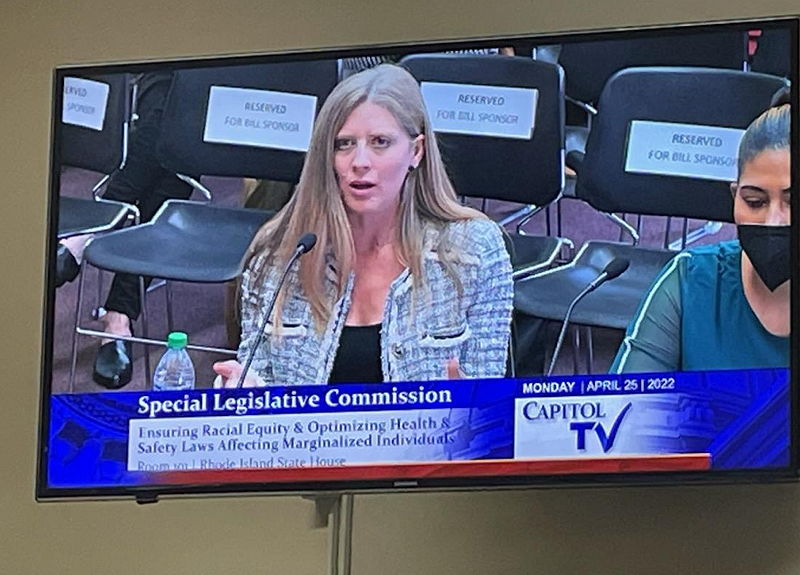



DSW Legal Director Melissa Broudo presented on the differences and distinctions between human trafficking and consensual adult sex work at the April 25 meeting of a legislative study commission in Rhode Island. She co-presented with a survivor of human trafficking, Danielle Ozuna, who shared her experience of coercion and exploitation. The study commission was formed last year following the unanimous passage of House Resolution 5250, which proposed a special legislative commission to study ensuring racial equity and optimizing health and safety laws affecting marginalized individuals. The bill, as passed, delineated who should sit on the commission, which includes thirteen members, including individuals with lived experience. Other members of the commission include two legislators, a member of COYOTE RI, a representative from Amnesty International, two representatives of organizations serving populations disproportionately impacted by the criminalization of commercial sex, the director of the Department of Health, an attorney from the Rhode Island Public Defender’s Office, the Rhode Island attorney general, or designee, a representative from the Brown University Center for the Study of Slavery and Justice, and the president of the Rhode Island Police Chief's Association, or their designee.
The study commission has met monthly since fall of 2021 with experts from both within the commission and outside of it testifying at each meeting. In her capacity as legal director at DSW and with over twenty years of experience representing and advocating for the legal rights of consensual adult sex workers and survivors of human trafficking, Broudo spoke about the devastating consequences of the conflation of consensual adult sex work and human trafficking. Broudo attended law school and received a Master of Public Health degree because she has long been interested in improving the health and safety of individuals engaged in commercial sex whether by choice or force, fraud, or coercion. She helped to draft the legislation proposing the study commission as she believes that public policy should be informed by research and evidence. The commission will present its findings to the legislature next year.
Read news coverage of the April 25 commission meeting here.
DSW advocates for the creation of study commissions focused on evaluating prostitution laws, addressing trafficking concerns, and identifying better ways to create support systems for both sex workers and trafficked people.
A study commission should examine and provide recommendations on the health and safety impacts of revising laws related to commercial sexual activity; identify the methods of human trafficking and exploitation to develop strategies to reduce these activities; and ensure accountability in the treatment of marginalized and targeted communities by police. Prostitution laws are often applied in a way that creates an environment in which exploitation thrives. Those laws often disproportionately harm already marginalized communities. They also fail to meaningfully address the issue of human trafficking. There is a need to comprehensively research and then reform legal and support systems around sex work and trafficking in order to keep people safe and ensure access to resources.
Read our fact sheet on study commissions to review existing laws and address trafficking and exploitation here.










DSW’s legal director, Melissa Broudo, and staff attorney, Rebecca Cleary, traveled to Rhode Island to testify in support of three important bills making their way through the Rhode Island legislature. As DSW works towards our ultimate goal of the decriminalization of consensual adult sex work, we are advocating for incremental measures that will reduce exploitation and violence perpetrated against sex workers and survivors of trafficking. If passed, the three bills introduced in RI, which Broudo and Cleary testified in support of, would bring immediate health and safety benefits to individuals engaged in sex work.
H7704, currently being reviewed by the House Judiciary Committee, grants immunity from prosecution for commercial sexual activity to any victim or witness of a crime if they report the offense to law enforcement, seek or receive health care services as a result of their involvement or witnessing the offense, or assist or attempt to assist in the investigation and prosecution of the offense. Importantly, this protection is honored even if they later withdraw their cooperation.
People involved in the sex trade (whether by choice or by force, fraud, or coercion) are often victims of violent crime and exploitation, but they frequently don’t report crimes perpetrated against them due to fear of arrest. When abusers are not reported to law enforcement, they are able to continue acts of violence and exploitation with impunity. Immunity laws allow sex workers and trafficked people to safely report crimes and seek medical care without the fear that they themselves will be criminalized. They equip law enforcement entities with an increased ability to identify, investigate, and convict perpetrators of violence and trafficking. Immunity laws directly protect victims and witnesses of violence and they ultimately benefit all communities by allowing law enforcement to better detect criminal activity.
H6637 / S2233, in committee, establishes criteria for the criminal offense of sexual assault when the victim is in the custody of a peace officer. It provides that a person convicted of custodial sexual assault would face imprisonment for not more than three years. Forty states have laws making sexual interaction between a law-enforcement agent and a person in their custody illegal.
As Broudo wrote, “Most people cannot believe police are permitted to do this. The reality is that they should not, but that they do, on quite a regular basis. Sex workers and those profiled as sex workers — especially transgender women of color — are subject to routine sexual assault by police offering ‘deals’ (‘if you do this, I will not arrest you now’). This is not consent — in fact, it is the very definition of coercion. Other states, including Nevada and Pennsylvania, are currently considering similar laws to punish custodial sexual assault. To say there is a power imbalance between law enforcement and those in their custody would be a severe understatement — people who are in custody have no agency, have fear about what is to come, and are at the complete and total mercy of those who have taken them into custody. There cannot possibly be a consensual sexual encounter between someone in custody and the person in charge of their freedom. When you think of who may be in custody, there is a disproportionate chance that person will be part of a marginalized or more vulnerable group [people of color, specifically Black and Brown people, are significantly more likely to be arrested]. When it comes to sex work, Black and Brown women, especially transgender women, are the most likely to be arrested — and also the most vulnerable to exploitation, abuse, and stigma. These factors are easily exploited by law enforcement.”
H7672, currently in committee, mandates a patient shall “be afforded respectful, considerate care” not be discriminated against on any basis including age, sex, gender identity, sexual orientation, or income source or profession.
Health care access is critical for the rights and safety of all. This is especially true when it comes to sex workers who face increased risk of sexually transmitted infections (STIs), sexual assault, and physical assault as a result of the criminalization of their work. Many sex workers do not seek critical healthcare because they have faced discrimination, or reporting to law enforcement by medical professionals. Protection against discrimination in seeking care is not only life-saving; it’s an important step in protecting against the spread of STIs and increasing resource access for some of our most underserved community members.
Further, healthcare providers serve a critical role in identifying and helping to report (with the patient’s permission) instances of human trafficking. Unfortunately, because of the criminalization of commercial sex, individuals trafficked for the purpose of selling sex are afraid to seek services. This is not only a violation of human rights, it is a public health and safety concern. We must make safe, confidential, and appropriate healthcare resources available to all individuals.
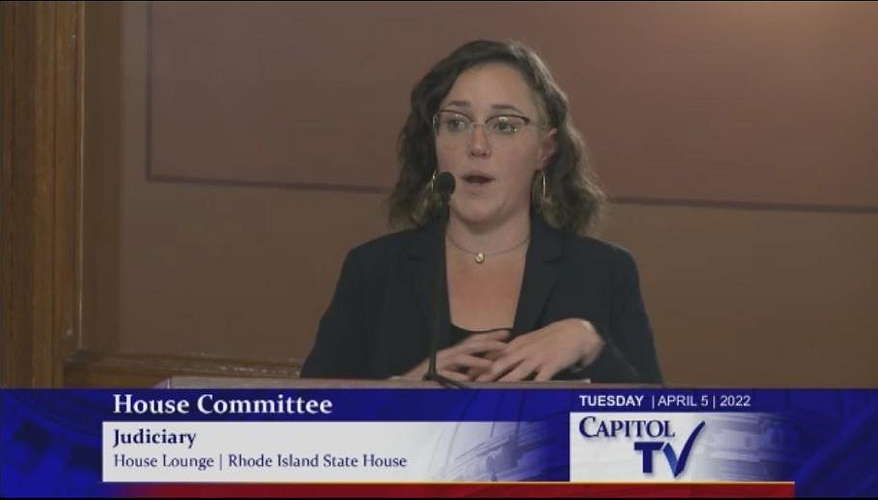

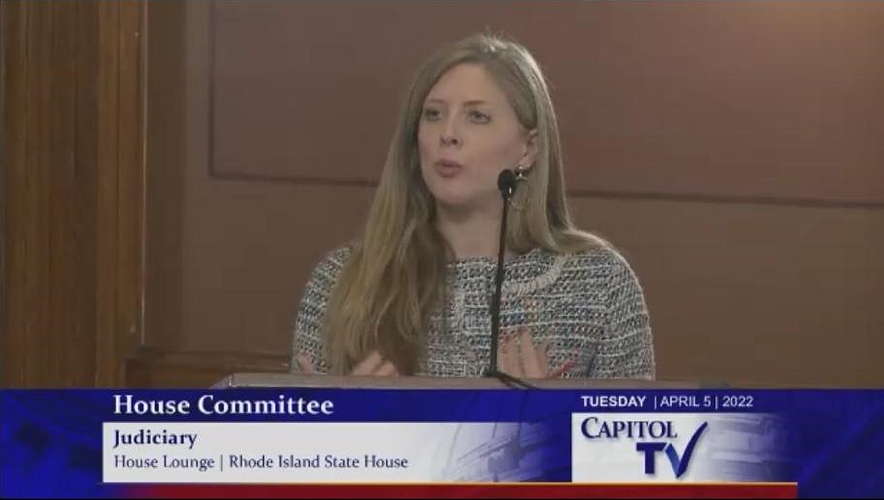







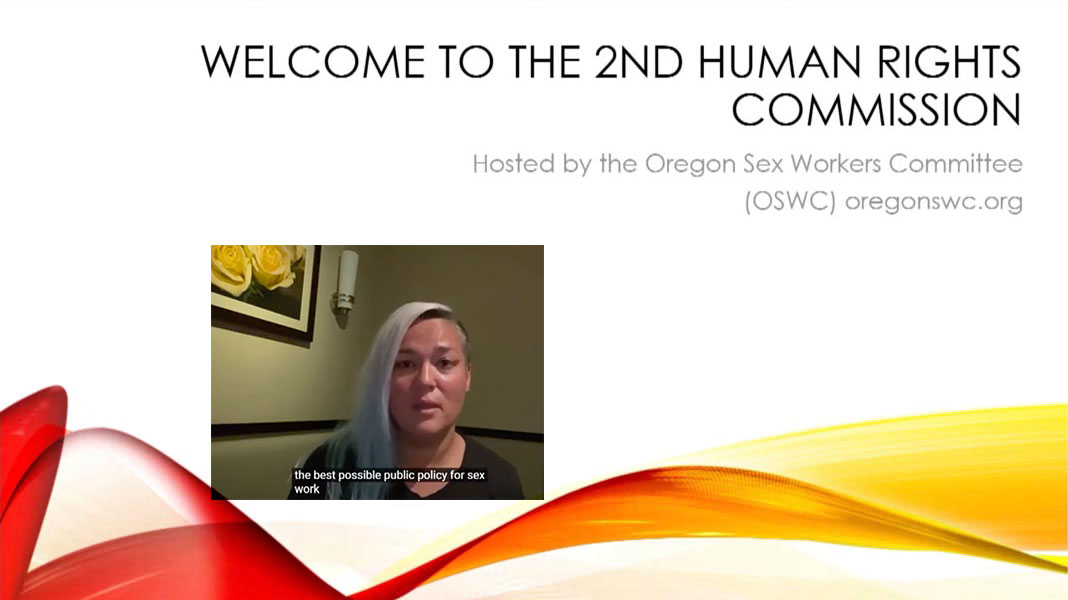

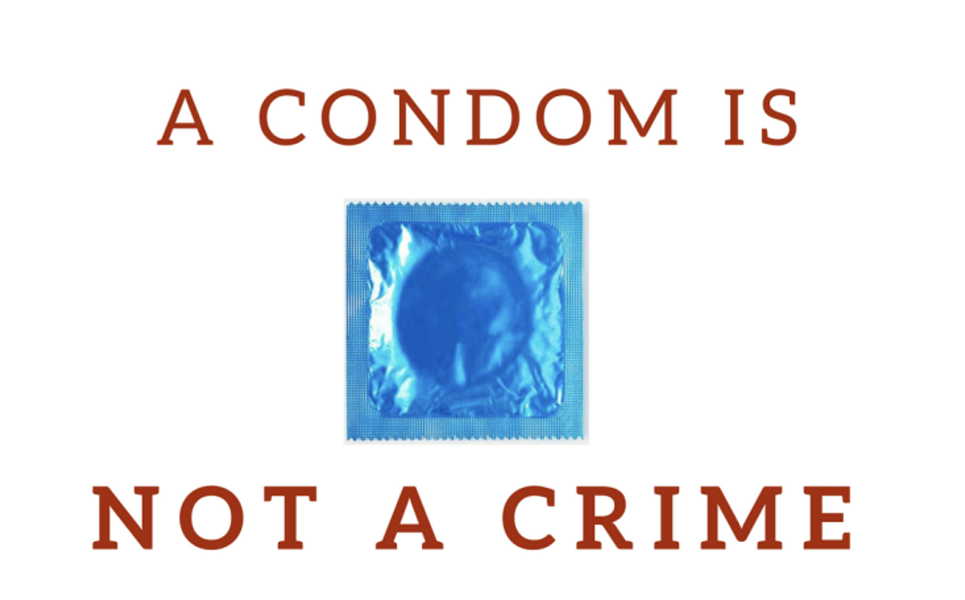



DSW Staff Attorney Rebecca Cleary and Legal Director Melissa Broudo provided background to the producers of HBO’s Last Week Tonight with John Oliver and the resulting 25-minute segment on sex work, which aired on February 27, was the best piece of mainstream reporting on the issue that we have seen. It is also hilarious.


DSW’s Melissa Broudo is featured on today’s edition of The Capitol Pressroom podcast.


DSW Research and Project Manager J. Leigh Oshiro-Brantly co-authored and participated in all aspects of the study “What will we do if we get infected?” a qualitative interview-based study of the COVID-19 pandemic and its effects on the health and safety of sex workers in the United States (SSM – Qualitative Research in Health, online December 8, 2021)


DSW Community Engagement Consultant Joaquin Remora participated in Beyond Sex Work Decriminalization: Possibilities and Priorities for Marginalized Sex Workers, a panel discussion by the Oregon Sex Workers’ Committee (OSWC) presented by Woodhull’s Human Rights Commissions (December 7, 2021)


If you are in New Hampshire, New York, Rhode Island, or Vermont, you will receive occasional legislative updates for that state (in addition to DSW’s monthly, national e-newsletter).
